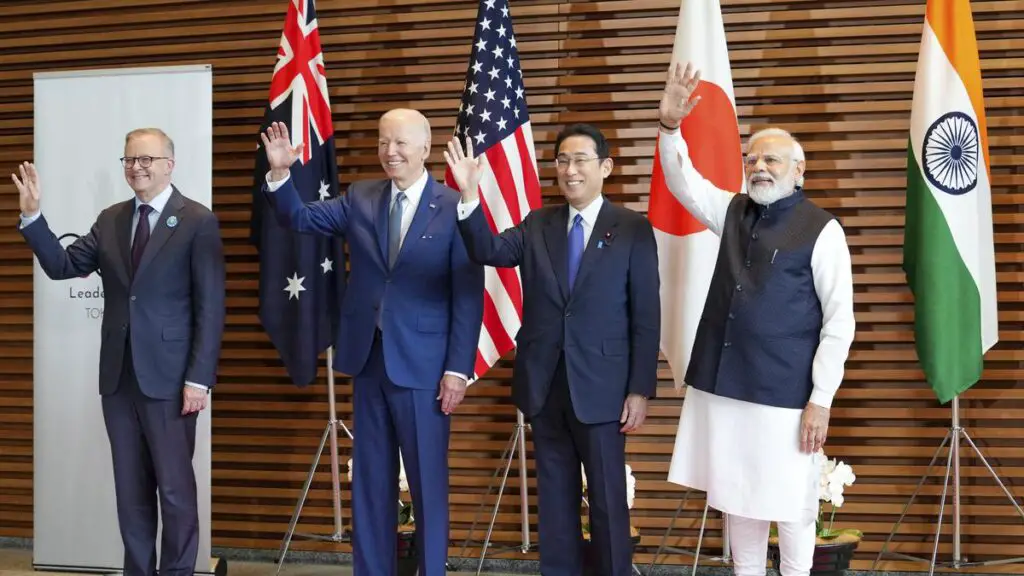The 2024 Quad Summit, expected to be held in India, will not take place in January as initially planned, according to sources. U.S. President Joe Biden, Japanese Prime Minister Fumio Kishida, and Australian Prime Minister Anthony Albanese are unlikely to travel to India around Republic Day, as proposed by New Delhi.
India’s Plans for the Quad Summit
Sources have indicated that the Quad Summit, which was slated to be held in January 2024 in India, will now be scheduled for a later time in the year. This shift in the timeline suggests that the leaders of the Quad nations will not be visiting India as initially anticipated.
Prime Minister Narendra Modi had previously announced during the Quad leaders’ meeting on the sidelines of the G-7 Summit in Japan in May that India would be hosting the next Quad leaders’ summit. However, the revised schedule indicates a delay in the summit’s timeline.
Challenges in Scheduling
The U.S. had been non-committal about President Biden accepting India’s invitation to be the chief guest at the Republic Day parade and attend the Quad Summit in January 2024. This reluctance was attributed to scheduling difficulties on the part of the U.S. administration.
Furthermore, the Australian National Day, which coincides with Indian Republic Day, would have posed challenges for Prime Minister Albanese to travel to India for the summit. These scheduling conflicts have necessitated a re-evaluation of the timing for the summit.
Future Timeline for the Quad Summit
While the exact dates for the rescheduled Quad Summit have not been announced, it has been clarified that the event will not take place in January as initially planned. The delay in the summit’s schedule provides an opportunity for the participating nations to address the logistical constraints and ensure a successful convening of the Quad leaders.
It is anticipated that discussions will continue among the Quad members to determine the most suitable timeline for the summit, taking into account the availability and commitments of the leaders from the respective nations. The delay in the schedule does not diminish the significance of the summit, but rather underscores the importance of coordinating the event to maximize its impact.
Implications for India’s Hosting
As the host nation for the Quad Summit, India’s government will need to recalibrate its preparations and logistical arrangements in light of the revised timeline. This includes revisiting the proposed agenda, logistical support, and security measures to ensure a seamless and productive summit once the new dates are finalized.
India’s role as the host of the Quad Summit signifies the country’s growing stature in global geopolitics and its leadership in promoting cooperation among democratic nations in the Indo-Pacific region. The success of the summit is pivotal to furthering India’s strategic partnerships and advancing shared goals in the region.
Looking Ahead
While the postponement of the 2024 Quad Summit presents logistical challenges and adjustments for the participating nations, it also offers an opportunity to coordinate a more comprehensive and impactful gathering of the Quad leaders. The rescheduled event will serve as a platform for the members to reaffirm their commitment to a free, open, and inclusive Indo-Pacific, and to address pressing regional and global challenges.
It is imperative that the Quad nations collaborate closely in the lead-up to the summit to ensure that the event serves as a catalyst for enhanced cooperation, strategic coordination, and tangible outcomes that benefit the region and the world at large.
As preparations continue for the rescheduled Quad Summit, stakeholders across the international community will keenly observe the developments, recognizing the significance of the event in shaping the trajectory of regional dynamics and global governance.
For more information on the Quad Summit and India’s foreign policy initiatives, visit the official Ministry of External Affairs website.
Overall, the postponement of the Quad Summit underscores the complexities of international diplomacy and the need for agile decision-making among nations. The eventual convening of the summit, albeit on a revised timeline, holds substantial promise for advancing mutual interests and strengthening collaborative efforts in the Indo-Pacific and beyond.

